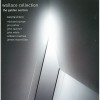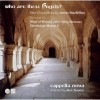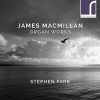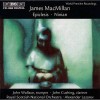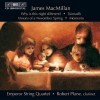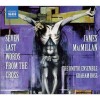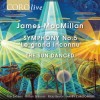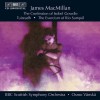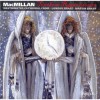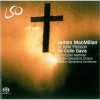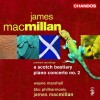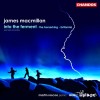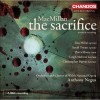| Country: | United Kingdom |
| Period: | Contemporary classical music |
Biography
James MacMillan, CBE (born 16 July 1959) is a Scottish classical composer and conductor.
MacMillan was born at Kilwinning, in North Ayrshire, but lived in the East Ayrshire town of Cumnock until 1977.
He studied composition at the University of Edinburgh with Rita McAllister, and at Durham University with John Casken, where he gained a PhD degree in 1987. He was a lecturer in music at the Victoria University of Manchester from 1986-1988. After his studies, MacMillan returned to Scotland, composing prolifically, and becoming Associate Composer with the Scottish Chamber Orchestra, often working on education projects.
He came to the attention of the classical establishment with the BBC Scottish Symphony Orchestra's premiere of The Confession of Isobel Gowdie at the Proms in 1990. Isobel Gowdie was one of many women executed for witchcraft in 17th century Scotland. According to the composer, "the work craves absolution and offers Isobel Gowdie the mercy and humanity that was denied her in the last days of her life".[1]
The work's international acclaim spurred more high-profile commissions, including a percussion concerto for fellow Scot Evelyn Glennie, Veni, Veni, Emmanuel. It was premiered in 1992 and has become MacMillan's most performed work. He was also asked by Mstislav Rostropovich to compose a cello concerto, which was premiered by Rostropovich himself in 1997.
Further successes have included his second opera The Sacrifice, commissioned by Welsh National Opera, Autumn 2007, which won a Royal Philharmonic Society Award, and the St John Passion jointly commissioned by the London Symphony Orchestra and Boston Symphony Orchestra[2] and conducted by Sir Colin Davis at its world premiere in April 2008. He was awarded the British Composer Award for Liturgical Music, for his Strathclyde Motets, in December 2008.
James MacMillan has worked occasionally with the folk band The Whistlebinkies, for whom he set and performed the William Soutar poem "Tryst". MacMillan conducted a new production of Parthenogenesis at the Royal Opera House in June 2009.
MacMillan's music is infused with the spiritual and the political. His Roman Catholic faith has inspired many of his sacred works; for example, Magnificat (1999), and several Masses. This central strand of his life and compositions was marked by the BBC Symphony Orchestra in early 2005, with a survey of his music entitled From Darkness into Light. MacMillan and his wife are lay Dominicans, and he has collaborated with Michael Symmons Roberts, a Catholic poet, and also Rowan Williams, the Archbishop of Canterbury.[citation needed]
Scottish traditional music has also had a profound musical influence, and is frequently discernible in his works. When the Scottish Parliament was reconvened in 1999 after 292 years, a fanfare composed by MacMillan accompanied the Queen into the chamber. Weeks after the opening ceremony, MacMillan launched an outspoken attack on anti-Catholicism in Scotland in a speech entitled "Scotland's Shame".[3]
MacMillan's use of (even subliminally) familiar themes has perhaps made his music more accessible.[citation needed] This accessibility is demonstrated by the range of his liturgical music:[citation needed] his Mass of 2000 was commissioned by Westminster Cathedral and contains sections which the congregation may join in singing.[4] Similarly, the St Anne's Mass and Galloway Mass do not require advanced musicianship, being designed to be taught to a congregation.
One of his most important commissions (by the Bishops' Conferences of England & Wales and of Scotland) was to write a new mass setting for choir and congregation to be sung at two of the three masses celebrated by Pope Benedict XVI during his Apostolic and state visit to Great Britain in 2010. First sung at mass at Bellahouston Park, Glasgow, on 16 September it was sung again at the mass and beatification of John Henry Newman at Cofton Park, Birmingham, on 19 September). He was also commissioned to write a setting of the text Tu es Petrus (Matthew 16:18) for the Pope's entry at mass at Westminster Cathedral on 18 September.







